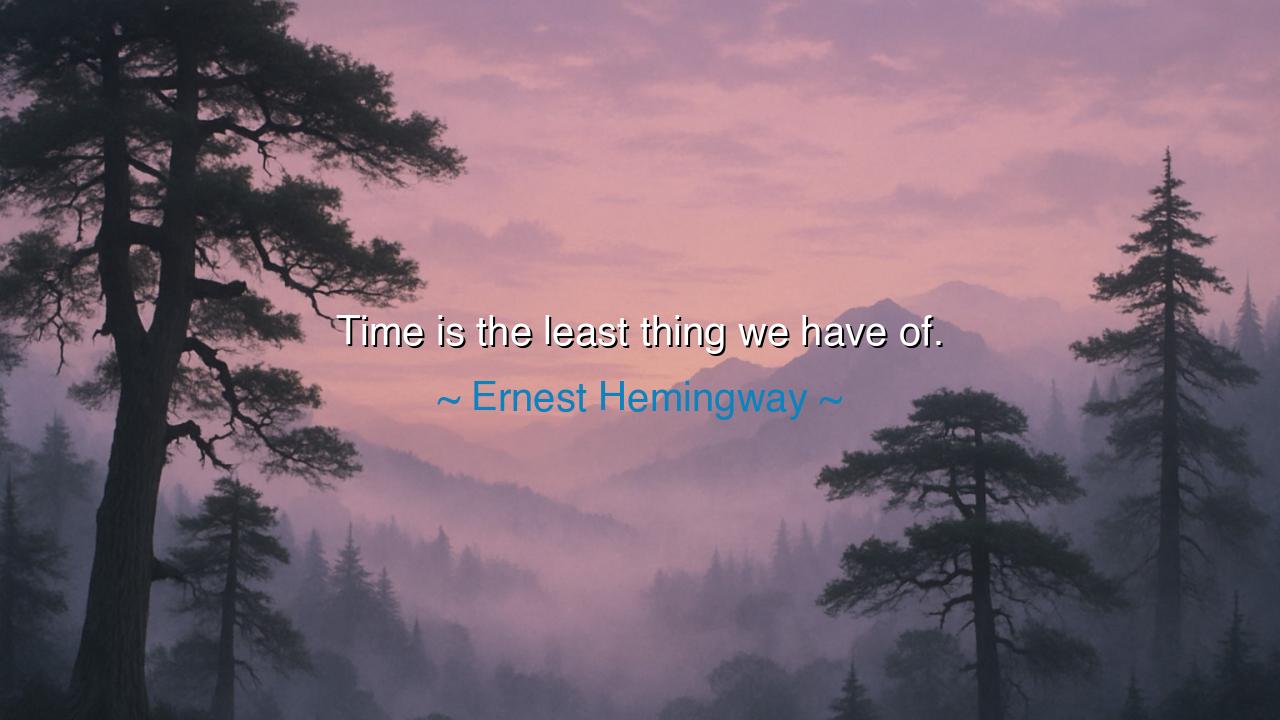
Time is the least thing we have of.






Hear the heavy and piercing words of Ernest Hemingway: “Time is the least thing we have of.” In this brief sentence, the great writer exposes a truth as old as the earth itself: of all the treasures man may possess—gold, land, knowledge, or even love—none is so scarce, none so fragile, as time. It slips through the fingers like water, it flees like the shadow at dusk, it cannot be hoarded, bought, or reclaimed. Hemingway, who lived with war, loss, and fleeting joys, knew this truth not as philosophy alone, but as lived experience.
The ancients, too, were haunted by this reality. The Stoics reminded men that memento mori—“remember that you must die”—should guide every action. To the Greeks, Chronos, the god of time, devoured his own children, a symbol of how the hours consume all things. Kings, warriors, and sages trembled alike before time, for though they could conquer empires or win the love of nations, not one could add a single heartbeat to his allotted span. Hemingway’s words are but a modern echo of this eternal lament: our greatest poverty is not of gold, but of hours.
Consider the story of Alexander the Great, who at the height of his power ruled much of the known world. And yet, at only thirty-two, death claimed him. Surrounded by treasures beyond imagination, he realized in his final days that none of his wealth could purchase another dawn. His last command, it is said, was that his hands be left outside his coffin, to show the world that even the greatest conqueror departs empty-handed. His empire outlived him, but his time was gone. Here lies the heart of Hemingway’s truth: time is the least, the rarest, and once spent, it is gone forever.
Hemingway himself lived fiercely within this awareness. He hunted lions, fought wars, fished the great seas, and wrote with urgency, as though he knew that each day of silence was a theft from eternity. His statement is not the complaint of an idle man but the cry of one who understood that time is a currency that demands spending, not saving. He saw too many waste it on fear, hesitation, and false pursuits. Thus, his words are both a warning and a call to arms: spend your time with intention, for it is the smallest treasure you own.
The danger for many is to live as though time is infinite, postponing joy, neglecting love, delaying purpose. But when the hourglass empties, no man can plead for more grains of sand. History is filled with regrets of those who discovered too late that they had the wealth of the world but no time to enjoy it. To heed Hemingway is to refuse such folly, to live not tomorrow, but today. For tomorrow is promised to no one, and yesterday is already beyond recall.
The lesson is clear: treat time as sacred. Guard it against waste, honor it by using it well, and devote it to what endures. Do not spend it only on toil, nor only on pleasure, but on the balance of both. Give it to those you love, to the work that matters, to the dreams that stir your heart. Refuse to squander it on bitterness, envy, or hollow pursuits. For in the end, it is not the abundance of years, but the fullness within them, that crowns a life with meaning.
So let Hemingway’s words be etched into memory: “Time is the least thing we have of.” Take them not as despair, but as instruction. Live as though each day is the coin of eternity placed in your hand, to be spent wisely and with courage. Let no hour pass unlived, unloved, or unremembered. For in honoring time, you honor life itself, and though the sands will one day run out, you will have spent them in a way that eternity itself cannot diminish.






AAdministratorAdministrator
Welcome, honored guests. Please leave a comment, we will respond soon